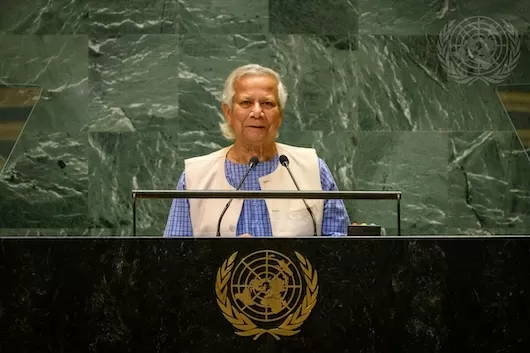In his first major address at the United Nations, the Chief Advisor of Bangladesh’s interim government, Dr. Muhammad Yunus, made a powerful appeal to the global community. Speaking at the 79th United Nations General Assembly (UNGA), Yunus called for greater cooperation and engagement with the ‘new Bangladesh’ in addressing global issues.
Bangladesh has come a long way since its independence in 1971. From being one of the poorest nations in the world, it has now emerged as a rapidly developing economy, with a growing middle class and a thriving business sector. The country has made significant progress in areas such as poverty alleviation, health care, education, and gender equality.
In his speech, Dr. Yunus highlighted the successes of Bangladesh and the potential for it to become a key player in addressing global challenges. He spoke about the country’s commitment to the United Nations’ Sustainable Development Goals (SDGs) and its efforts in achieving them.
Bangladesh has made remarkable progress in poverty reduction, with the poverty rate declining from over 40% in 1990 to around 20% in 2020. This has been achieved through initiatives such as microcredit programs, which have helped millions of people escape the cycle of poverty. Dr. Yunus, who is known as the father of microfinance, has been instrumental in creating these programs and has played a crucial role in lifting millions of people out of poverty.
He also spoke about the country’s efforts in improving healthcare and education, including a successful campaign to eradicate polio and an increase in female enrollment in schools. Bangladesh has made significant strides in healthcare, with a sharp decline in child mortality rates and a rise in life expectancy.
Dr. Yunus highlighted the country’s commitment to environmental sustainability and emphasized the need for urgent action to combat climate change. Bangladesh is one of the countries most vulnerable to the effects of climate change, with frequent natural disasters and rising sea levels. Despite this, the country has taken proactive measures to reduce its carbon footprint and promote renewable energy, such as the installation of solar panels in rural areas.
The Chief Advisor also touched upon Bangladesh’s efforts in promoting gender equality and empowering women. Bangladesh has made significant progress in this area, with women holding key positions in politics, business, and academia. Dr. Yunus emphasized the importance of inclusive development, where women and marginalized communities are given equal opportunities to thrive.
In his address, Dr. Yunus called for greater collaboration between nations to address global challenges, stating that no country can solve these issues alone. He urged the international community to engage with Bangladesh and its ‘new’ development model, which focuses on people-centered and sustainable growth.
As a country that has faced its fair share of challenges, Bangladesh understands the importance of international cooperation and solidarity. Dr. Yunus hopes that by working together, we can build a better future for all.
The United Nations General Assembly provides a platform for world leaders to come together and discuss pressing issues facing humanity. Dr. Yunus’ speech serves as a reminder that we must not forget the progress and potential of developing nations, and that they have a valuable contribution to make in the global arena.
Bangladesh may be a small country, but it has big dreams and a determination to achieve them. Dr. Yunus’ appeal for greater engagement with Bangladesh and its ‘new’ development model is a call for the international community to recognize and support the country’s efforts in achieving the SDGs.
In conclusion, Dr. Yunus’ address at the United Nations has put the spotlight on Bangladesh’s achievements and its potential to contribute to global efforts. As we work towards a better future for all, it is essential to include developing nations such as Bangladesh in the conversation. Let us heed Dr. Yunus’ call and join hands to create a more prosperous, sustainable, and inclusive world for future generations.



